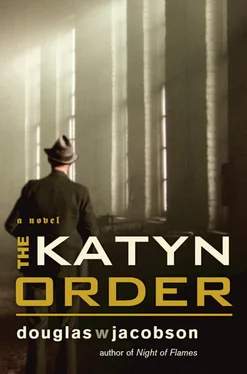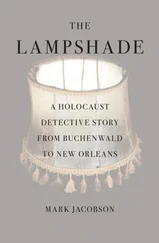Zeeka drew the four of them together, maneuvering away from the crowd. “I have something important to tell you,” she said lowering her voice. “Colonel Stag took me aside a few hours ago. He told me about the ceasefire and the terms of surrender.”
Natalia listened silently to her former Minerki unit leader, sensing that something important was coming next.
“I was desperately hoping that I could find all of you,” Zeeka said. “Colonel Stag has ordered me to gather a small group who are willing to try to escape.”
Natalia glanced at Hammer and Rabbit. Neither of them said a word, but they edged in closer.
Zeeka continued. “We’re not the only ones. Stag said there will be other groups, but we’re not to know who, and we are not to act together. Our instructions are to dispose of our weapons, armbands, badges—anything that would connect us with the AK—then blend in with the civilians as they’re evacuated from the city.”
Natalia instantly understood. “The AK is being disbanded,” she said.
Zeeka nodded. “Officially, that’s true. General Bor has saved our lives by negotiating combatant status for the AK. As insurgents we would be immediately executed. But the AK as an official fighting force is being disbanded. Those who surrender to the Wehrmacht can expect to be detained in POW camps until the war is over.”
“And then wind up in the hands of the Russians,” Hammer growled. “So, fuck ‘em, why surrender? We may as well continue to fight and die right here.”
Zeeka shook her head. “It’s the only way to save the civilian population. If the AK refuses to disband and surrender, the Germans will burn the city to the ground and everyone in it—women, children, old people, everyone. There is no other choice. The AK has to surrender and march out of the city.”
“But not all of us,” Natalia said.
Zeeka looked each one of them in the eye. “No, not all of us. My orders from Colonel Stag are to select a small group I can trust and who are willing to take the risk. If we’re successful in escaping, our orders are to lay low for several months, blend in with the local population and then make contact with designated AK cells and carry on the fight.” She paused. “You have to understand that if we’re caught by either the Germans or the Russians, we’ll be executed on the spot.”
Natalia glanced again at Rabbit and Hammer. They all looked at Zeeka and nodded.
17 JANUARY 1945
GENERAL ANDREI KOVALENKO ordered his driver to halt at the midway point of the pontoon bridge over the frozen Vistula River. In the freezing cold he stepped out of the GAZ-11, braced against the wind and stared at the snowbound ruins of Warsaw. By now he was beyond the frustration that had gripped him for more than four months while his army was ordered to sit by idly. He was beyond trying to rationalize any tactical reason for the Red Army’s inaction when his vastly superior forces could have swept in at any time and crushed the Nazi bastards.
From his command post on the east bank of the Vistula last August, he had watched the destruction of the City Center and Old Town. He knew about the escape through the sewers of several thousand AK commandos. The poor bastards had continued their futile struggle through September, before the inevitable capitulation. And then the forced expulsion of the remaining citizens of Warsaw: more than four hundred thousand souls, who plodded out of their city under gunpoint to transit camps many kilometers away.
Then, for another three months, Kovalenko had watched the Nazis systematically destroy every remaining structure in Warsaw. While other Red Army units to the north and south overwhelmed the German Wehrmacht, pushing them westward across the plains of Poland, he continued to follow his orders, standing by while German tanks and flamethrowers laid waste to the city.
Kovalenko shivered in the cold, but he stood on the windswept bridge for another moment, gazing at the frozen rubble beyond the river. Then he got back in the car and ordered the driver to proceed into what was left of Warsaw.
By noon, a temporary command post was set up in the barely recognizable central square in Old Town. Nothing remained standing. The Royal Castle, home of Poland’s royalty for three hundred years had been leveled, together with St. John’s Cathedral, which had stood on the same site since the fourteenth century. The merchant houses and guild halls, the shops, cafés, art galleries and museums were reduced to piles of rubbish. The windblown, snow-covered streets were deserted and, save for a few stray dogs struggling through the snowdrifts, not a single sign of life remained.
Russian tanks, fitted with plows, had pushed back enough of the rubble to erect a headquarters tent. Diesel-powered generators and heaters were set up and a communications center established to serve notice that the Red Army was now in control of what little was left of Warsaw.
When General Kovalenko’s car pulled up in front of the headquarters tent, two Red Army soldiers scrambled to attention and one opened the rear door. Kovalenko stepped out, glanced around quickly, then entered the tent. He handed his greatcoat to a soldier at the door and surveyed the cadre of officers scurrying around with messages and instructions for the regiments that were about to enter the wasteland of Warsaw.
Captain Andreyev sat at a table in the center of the tent studying a report. He stood up and saluted smartly. “Dóbraye útra, General,” Andreyev said loudly enough to stop all activity inside the tent. “Welcome to Warsaw.”
Kovalenko grunted and waved his hand, signaling everyone to carry on, then stepped over and tossed his hat on the table. He pulled a pack of cigarettes from his shirt pocket.
Andreyev produced a lighter and lit the general’s cigarette. “You have a visitor,” he said.
Kovalenko blew out a cloud of smoke and sat down at the head of the table. “A visitor? Here?”
Andreyev nodded. “An NKVD officer. Major Tarnov.”
“Tarnov? What the hell is he doing here?”
“He arrived first thing this morning in his own automobile, as soon as we crossed the river. Do you know him?”
Kovalenko thought back to a dreary, rainy night in Siberia in 1940. But Andreyev didn’t need to know about that. At least, not yet. “I know the name, that’s all. What does he want to do, hunt down rats in the sewers? There’s nothing left.”
Andreyev shrugged. “He wouldn’t say. Just insisted on talking with you as soon as you arrived.”
Kovalenko stood up. “Go get him. Let’s find out what service we can provide for the secret police.”
Andreyev left the tent and returned a few minutes later accompanied by a short, stocky NKVD officer. Andreyev stood back as the officer stepped up to the table, saluted the general and said, “Major Dmitri Tarnov, NKVD 105th Frontier Guards Division.”
Kovalenko nodded without speaking.
Tarnov continued. “I have orders to detain and interview any terrorist insurgents of the AK held in your custody.”
Kovalenko studied the thick-necked NKVD officer, who obviously didn’t recognize him from the incident in Siberia. Then he smiled, sat down and took a long drag on his cigarette. He didn’t offer Tarnov a seat. “Well, Major Tarnov, did you look around when you arrived in Warsaw this morning? If you did, then you must have noticed that there is nothing left—no buildings, no churches, no houses. There’s no fucking people left, Major, let alone terrorist insurgents.”
Tarnov appeared unfazed. “We understand that several thousand AK terrorists escaped from the German Wehrmacht at the time the city was evacuated. I have orders to—”
Читать дальше












